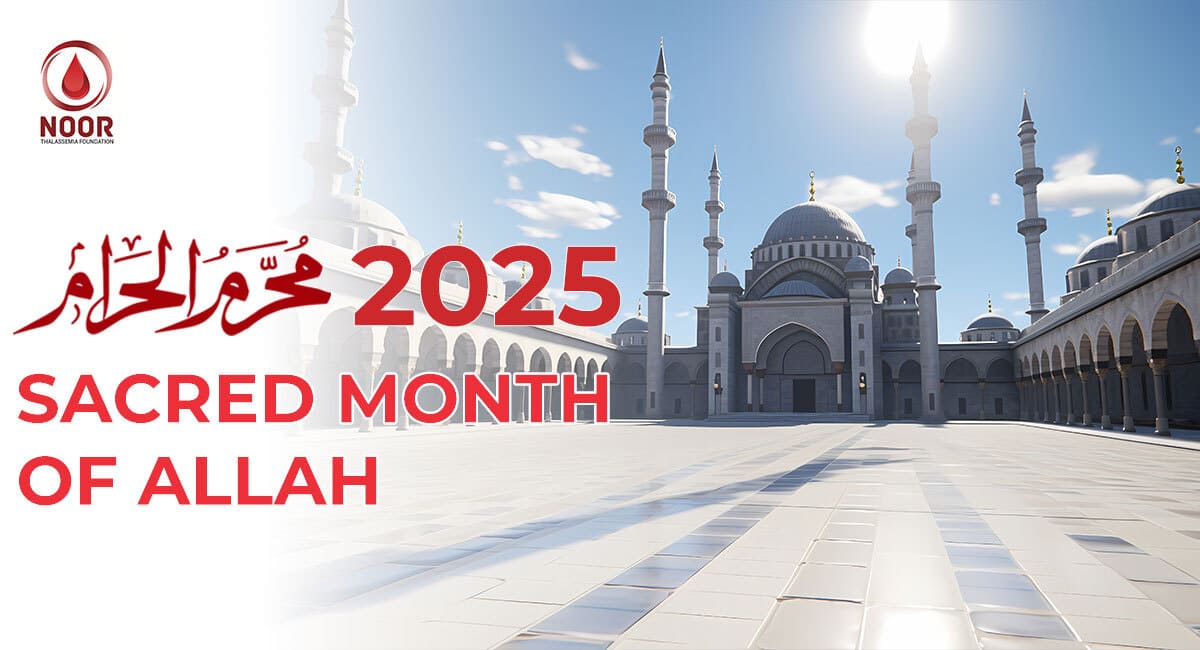Muharram 2025 - Understanding Muharram, Ashura, and Their Significance
17-Jun-2025

Discover the significance of Muharram and Ashura 2025, their history, spiritual meaning, and the importance of charity through Noor Thalassemia Foundation.
The Islamic New Year, known as Happy Islamic New Year, marks the beginning of the first month in the Islamic calendar, Muharram ul-Haram. As Muslims around the world prepare to observe this month, the significance of the events and spiritual observances within it becomes more pronounced. For Muslims, it is a time for reflection, fasting, prayer, and charity. It is also a time when they remember the historical events that shape their faith, especially the martyrdom of Imam Hussain (A.S.) at the Battle of Karbala. This article will explore the significance of Muharram, the observances of Ashura, the importance of giving during this time, and how organizations like the Noor Thalassemia Foundation play a crucial role in helping people in need.
Muharram - The First Month of the Islamic Calendar
The Islamic calendar, also called the Hijri calendar, consists of 12 lunar months that begin yearly, with Muharram as its first or starting month. For Muslims worldwide, this first Muharram marks a time of reverence and solemnity as one of four sacred months during which fighting is forbidden - making its start important in commemoration and reverence around the Islamic world.
Muharram Moon Sighting in Pakistan
Each Muslim month begins with its respective sightings of the Moon, and Muharram ul-Haram is no exception. In Pakistan, this event is essential in commemorating and marking the start of Islamic New Year observances by the Ruet-e-Hilal Committee with official confirmation announcing when each month should start and end - it's something Muslims throughout Pakistan eagerly anticipate to begin on time each month! This annual Moon sighting event can only help ensure they begin on time each month! This yearly event ensures Muslims start their calendar months on time each time!
Muharram marks an exciting new chapter of Islamic calendar history and sets an auspicious beginning for months ahead. The sighting of the Moon marks an event on an astronomical plane. It can be deeply spiritual for some as it represents time passing and faith renewal and planning for growth, devotion, and charity over coming months.
Pakistan celebrates Muharram with public holidays that serve to commemorate this annual religious festival, offering individuals and communities alike an opportunity to partake in spiritual practices, reflect upon Prophet Muhammad (s.a.w) and his family sacrifices, attend spiritual gatherings, and engage in other forms of commemoration, such as Ashura's day on the 10th muharram.
At various community centers and organizations during the Muharram holidays, organizations hosted events, lectures, and gatherings about its history and spiritual meaning. Pakistanians especially mark Muharram with solemn processions commemorating sacrifice, courage, and compassion as part of Muharram festivities.
Muharram and Ashura Muharram's significance lies within their place in Islamic history. At its core lies Karbala, which occurred in 680 CE. On youm e Ashura (10th Day of Muharram), Imam Hussain A.S. was martyred while resisting Yazid Ibn Muawiya's oppressive rule - this event holds significant meaning to Muslims.
Ashura Day marks one of the most sacred occasions in each Muslim calendar month. It marks an opportunity to recall Imam Hussain (A.S.) and his followers' sacrifice in standing firm against oppression, injustice, and tyranny. While commemorating historical events is appropriate for Ashura, its significance also encompasses acts of personal reflection, spiritual renewal, and charity work.
Ashura Fasting and Dua
Fasting on Ashura is an act of worship; according to Hadith, Prophet Muhammad (PBUH) recommended fasting during the 10th Muharram to commemorate when Prophet Musa (A.S.) led Israel away from Pharaoh's oppressive rule and into freedom under Prophet Musa (A.S.). Because of this significance, fasting at Ashura is considered vital within Islam - many believers consider fasting an opportunity to reflect deeply and repent of past sins while at the same time fulfilling spiritual rewards and forgiveness of past sins committed.
Muslim worshipers also recite special prayers and duas during Ashura, including Dua e Ashura, which has proven highly beneficial, is believed to have immense spiritual blessings, and is regularly repeated to seek Allah's mercy, forgiveness, and blessings.
Ashura Holidays in Pakistan
Ashura holidays in Pakistan mark an intense spiritual activity period for Muslims living in cities with substantial populations. Ashura commemorations often feature procesions to remember Imam Hussain (A.S.), with participants mourning, chanting, and carrying flags to honor his legacy of sacrifice and justice. Furthermore, special lectures explain events from Karbala while Imam Hussain's (A.S) message continues to influence Muslims today.
Muharram 2025 and the Date of Ashura
Pakistan observes Ashura holidays annually on July 5th and 6th in Muharram but it depends on moon sighting in pakistan. Businesses close, and people devote themselves to acts of worship, charity, and remembrance of the Prophet's family who martyr during Ashura's enmity against oppression. It serves as an occasion of somber mourning while reminding all to stand against oppression.
As Muslims around the globe anticipate Muharram 2025 and Ashura Day 10th Muharram, we look forward to its start and significance for millions worldwide. Moon sightings will signal its start, followed by moon day prayers, then by celebrations on Muharram 10th Day, followed by commemorations for Imam Hussain A.S. on the 10th Muharram Day itself (known as Ashura).
The Role of Charity During Muharram
Pakistan will mark Ashura 2025 by hosting community gatherings, charity events, and religious ceremonies. Muslims also engage in acts of charity by helping the needy or those suffering from illness - this year, primarily through supporting the Noor Thalassemia Foundation, who provide free treatment to patients living with Thalassemia; their support during such difficult periods is especially critical during such pivotal years.
Muharram and Ashura offer an opportunity for charity. One key value emphasized during Muharram is selflessness - something Imam Hussain (A.S) illustrated during his fight against injustice - with many charitable acts taking place throughout this month of giving; donations to those in need are particularly welcome during Muharram and Ashura.
Begin the Islamic New Year by donating to Noor Thalassemia Foundation
Noor Thalassemia Foundation in Pakistan is at the forefront of providing free treatment to underprivileged patients suffering from Thalassemia. Many generous people donate during Muharram to organizations offering this essential help, ensuring those affected have sufficient medical support and resources to fight this life-threatening condition. Muharram marks an occasion to commemorate past lives while building hopeful futures by offering vital healthcare to the less privileged.
Conclusion: Muslims worldwide celebrate Happy Islamic New Year and prepare to observe Muharram al-Haram with reverence and charity. The first month of Islam's calendar, with Ashura fasting commemoration and Imam Hussain (A.S.) memorializing as its central events, serves as an invaluable reminder of sacrifice, courage, and standing against injustice.
 +042 111 666 783
+042 111 666 783